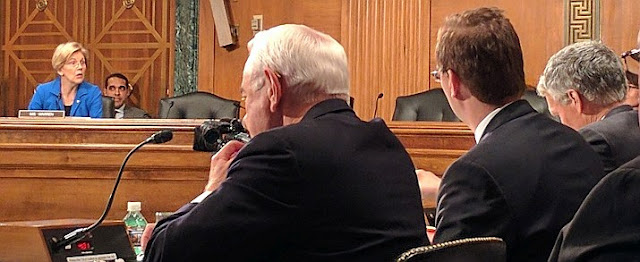Senate Banking Committee Hearing on Fostering Economic Growth by Kari Nelson, Impact Investing Intern, University of Virginia
Soon, it may be easier to be a Wall Street Bank. We knew that one of President Trump’s central campaign promises was to dismantle the Dodd-Frank Wall Street Reform and Consumer Protection Act of 2010 (LA Times)— passed after the 2007-2009 financial crisis to prevent similar crises from occurring—but that didn’t necessarily mean anything major was going to happen. Campaign promises go unfulfilled all the time (*cough* the Wall *cough*). Now, the Trump administration seems to be moving to follow through on dismantling Dodd-Frank. With that in mind, we take a look at developments in this area over the past few weeks to see what changes are likely in the near future.
On June 8, there was a surge of excitement (either out of fear or joy, depending on your perspective) when the House passed the Financial Creating Hope and Opportunity for Investors, Consumers and Entrepreneurs Act, which would repeal many of Dodd-Frank’s banking reforms (CNBC). Then, everyone calmed down a bit and realized that Senate Democrats could block the bill from passing so the House vote was a largely symbolic victory for the Republicans and the banking industry (CNBC).
But, on June 12, Treasury Secretary Steven Mnuchin released a report—the first of four examining Dodd-Frank ordered by Trump—proposing many of the same changes as the Financial CHOICE Act (LA Times). These proposals have been on Wall Street’s wish list since Dodd-Frank was passed, reflecting the fact that the Treasury Department consulted with 17 times more banking industry groups than consumer groups when developing the report (Fortune). Note though that the suggestions in the Treasury report present a real danger to consumers because “about 80% of the substance in the report can be accomplished by regulatory changes,” according to Mnuchin (Fortune). Therefore, a Senate Democratic filibuster would not block the majority of the changes proposed in the report.
On June 22, the Senate Committee on Banking, Housing, and Urban Affairs held a hearing entitled, “Fostering Economic Growth: Regulator Perspective,” the third in a series of hearings held by the Banking Committee as it prepares to draft a regulatory relief bill (Washington Post). I attended this hearing in order to get a sense of the vibe in the room and one thing quickly became clear: regulators are siding with Trump and the big banks on this one.
Among the main targets brought up by the panel – full list here – were requirements for living wills, the asset thresholds for stress tests, strict leverage ratios, and the Volcker Rule. But the real question is: will any of these changes (which require legislation) make their way into the upcoming bill? In his opening statement, Chairman Mike Crapo (R-Idaho) expressed his commitment to bipartisan regulatory reforms in this area, so presumably Crapo and the other Republicans on the Senate Banking Committee will be looking to please the moderate Democrats first.
Currently on the Committee are three moderate Democrats from red states who have tough reelection races coming up in 2018 – Sen. Joe Donnelly (Indiana), Heidi Heitkamp (North Dakota), and Jon Tester (Montana). This may be an opportunity for Republicans because these three Dems need to demonstrate to constituents that they can work across the aisle to pass legislation (Washington Post). Tester even said that he has an “open mind” regarding Volcker Rule rollbacks (Washington Post). The buy-in from these moderates may be enough to bring a regulatory relief bill to the floor, but I find that unlikely. I tend to agree with Tory Newmyer of the Washington Post who judged that a regulatory relief bill will not make it to the floor of the Senate if the liberals on the Committee – led by Sen. Elizabeth Warren (D-Massachusetts) – maintain their current commitment to stopping the bill; Republicans likely won’t try to bring a bill to the floor unless left-wing Dems in the Senate agree to limit amendments (this would prevent poison pill amendments, or amendments intended to weaken a bill’s effect or prevent it from passing).
As long as Warren and the rest of the left remain committed to stopping this bill, they will not be agreeing to any such deal. It doesn’t seem that Warren will be backing down any time soon, pointing out during the hearing that she saw no benefits to the recommendations in Mnuchin’s Treasury Report and telling the Wall Street Journal that she views any significant changes to Dodd-Frank as dangerous to the American economy (Washington Post).
So, I’m sorry Wall Street, but unless Warren and her fellow progressives have a massive change-of-heart it seems that regulatory relief, at least relief based on legislation, may not come any time soon.
